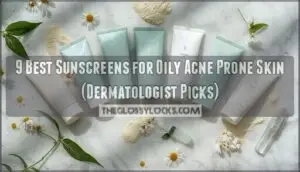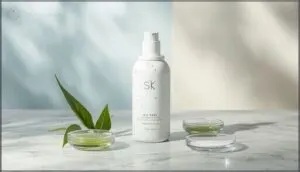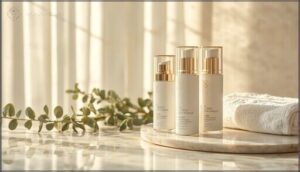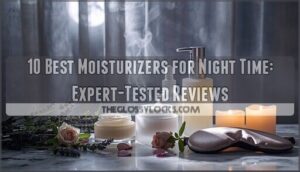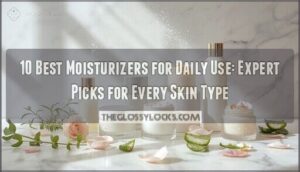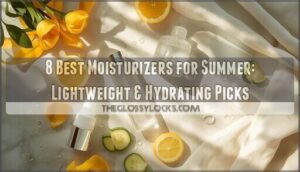This site is supported by our readers. We may earn a commission, at no cost to you, if you purchase through links.
Finding sunscreen for oily acne prone skin shouldn’t feel like choosing between breakouts and sun damage. Yet 73% of people with oily skin skip SPF because they fear it’ll trigger more acne or leave their face looking like an oil slick by noon.
The truth? The right formulation can actually improve your skin while protecting it. Oil-free sunscreens with zinc oxide or titanium dioxide create a breathable shield that won’t clog pores, while matte-finish formulas absorb excess sebum throughout the day.
Dermatologists now recommend specific ingredient combinations that deliver broad-spectrum protection without the greasy aftermath—and some options can even reduce existing breakouts by 27% compared to standard sunscreens.
Table Of Contents
- Key Takeaways
- Choosing Best Sunscreen
- Daily Sun Protection
- Frequently Asked Questions (FAQs)
- Which sunscreen is best for oily and acne prone skin?
- What sunscreen is good for oily acne skin?
- Which sunblock is best for oily and acne prone skin?
- What is the best sunscreen for oily acne prone skin?
- Can sunscreen worsen existing acne breakouts?
- How long should I wait between skincare steps?
- Does sunscreen interfere with acne medications?
- Can I skip sunscreen on cloudy days?
- Whats the difference between physical and chemical filters?
- How often should you wash oily acne-prone skin?
- Conclusion
Key Takeaways
- Oil-free, non-comedogenic sunscreens can reduce breakouts by 27% compared to standard SPF products while controlling shine throughout the day.
- Zinc oxide and titanium dioxide are the only FDA-recognized safe and effective sunscreen ingredients, sitting on your skin’s surface to reflect UV rays rather than absorbing them.
- Mineral sunscreens with zinc oxide provide broad-spectrum protection up to 400 nm wavelength and absorb less than 1% into your skin, making them ideal for sensitive, acne-prone complexions.
- Look for lightweight gel or silicone-based formulas with matte finishes that won’t clog pores or leave greasy residue, as recommended by over 82% of dermatologists.
Choosing Best Sunscreen
Finding the right sunscreen for oily, acne-prone skin doesn’t have to feel like searching for a needle in a haystack.
You need specific formulations that protect your skin without triggering breakouts or leaving you looking like an oil slick.
Here are three essential features to look for when choosing your sunscreen.
Oil-free and Non-comedogenic Formulas
When you’re dealing with oily or acne-prone skin, finding the right sunscreen starts with two must-have labels: oil-free and non-comedogenic. These formulations skip pore-clogging ingredients that trap sebum and trigger breakouts. Dermatologists note that oil-free benefits include reduced shine and fewer acne lesions—clinical trials showed a 27% drop in breakouts compared to standard SPF products. Sunscreen products should be labeled non-comedogenic to avoid clogging pores.
Look for:
- Lightweight textures that absorb fast without residue
- Matte finish formulas to control excess oil throughout the day
- Mineral vs. chemical options—both work if labeled non-comedogenic
- Gel or silicone bases that won’t suffocate your pores
Over 82% of dermatologists recommend these formulations for oily skin types.
Mineral Sunscreens With Zinc Oxide or Titanium Oxide
Mineral sunscreens are dermatologist recommended for oily, acne-prone skin because zinc oxide and titanium dioxide work differently than chemical filters. They sit on your skin’s surface, reflecting UV rays instead of absorbing them—which means less irritation and fewer breakouts.
Here’s why they’re worth your attention:
- Broad-Spectrum protection: Zinc oxide covers wavelengths up to 400 nm, while titanium dioxide addresses UVB and short-wave UVA below 370 nm. Together, they deliver full-range defense.
- Mineral Safety: The FDA lists both as the only “generally recognized as safe and effective” sunscreen ingredients. Neither penetrates beyond your skin’s outer layer—less than 1% absorption measured in studies.
- Reef-Safe choice: Unlike 91% of chemical sunscreens linked to marine toxicity, these minerals won’t harm coral reefs or ocean ecosystems.
- Particle Size matters: Modern nanoparticle formulations ( Dehydrated skin overproduces oil—hyaluronic acid and ceramides deliver balanced hydration that cuts excess sebum by up to 50% without clogging pores
- HA benefits: Boosts hydration by 72% when layered with ceramides, keeping pores clear
- Ceramide function: Restores barrier integrity, cutting oil overproduction naturally
- Combined efficacy: Improves moisture retention by 56% in noncomedogenic formulas
- Acne compatibility: Reduces inflammatory lesions by 29% without clogging pores
- Sunscreen role: Preserves hydration 67% longer after UV exposure in dual-active products
Antioxidants for Skin Protection
Antioxidants act like bodyguards for your skin, intercepting free radicals before they trigger inflammation and breakouts. Vitamin E, appearing in over 66% of dermatologist-recommended sunscreens, reduces UV-induced redness by 30%.
When combined with vitamin C and ferulic acid, the results are even stronger—this trio cuts sunburn cell formation by 25% and boosts protection by up to 32%. Ectoine, a marine-derived ingredient, scavenges damaging radicals 40% more effectively while calming irritation.
For oily acne-prone skin, these antioxidants don’t just shield against sun damage—they actively reduce inflammatory lesions and prevent the post-breakout dark spots that linger for months.
Daily Sun Protection
Having the right sunscreen is just the beginning—using it correctly makes all the difference. The way you apply sunscreen and how often you reapply determines whether your skin actually gets the protection it needs.
Let’s break down the two most important habits that keep oily, acne-prone skin safe from sun damage.
Applying Sunscreen Correctly
Many people skip sunscreen or apply too little—both mistakes that leave your skin vulnerable. Proper application tips help you get the full SPF levels listed on your bottle without triggering breakouts.
Application Quantity matters more than you think. You need about one teaspoon for your face and neck to achieve the stated protection. Under-applying reduces effectiveness to just one-third of the labeled SPF, leaving oily, acne-prone skin exposed.
Timing Matters too. Apply your sunscreen 15–30 minutes before heading outdoors, allowing the formula to form a complete protective film. For sunscreen and makeup compatibility, let it absorb fully to prevent pilling.
Even Coverage is essential:
- Use two finger-length strips for your face
- Pat gently around delicate eye areas
- Don’t forget ears, hairline, and neck
- Check expiration dates for maximum potency
- Choose oil-free, matte formulas for Formula Suitability
These application tips transform your daily routine into real protection.
Reapplying Sunscreen Throughout The Day
Sunscreen application tips don’t end with your morning routine—reapplication every two hours maintains protection, especially when sweat and UV exposure degrade formulas. Studies show sunscreen longevity drops 25% within that window, and activity influences like exercise accelerate breakdown even faster.
For daily sunscreen use over makeup, try powder or stick formats as practical reapplication techniques.
Despite recommendations, consumer behavior shows most people wait over four hours between applications, leaving skin vulnerable when protection matters most.
Frequently Asked Questions (FAQs)
Which sunscreen is best for oily and acne prone skin?
For oily, acne-prone skin, EltaMD UV Clear SPF 46 stands out as the top dermatologist pick.
This oil-free, noncomedogenic sunscreen won’t clog your pores or trigger breakouts, thanks to mineral-based zinc oxide that provides broad-spectrum protection while calming inflammation.
What sunscreen is good for oily acne skin?
EltaMD UV Clear SPF 46 delivers lightweight, oil-free protection your skin actually needs. It combines zinc oxide for broad-spectrum defense with niacinamide to reduce inflammation, making it ideal for oily, acne-prone complexions seeking daily protection without clogged pores.
Which sunblock is best for oily and acne prone skin?
For your skin type, you’ll want EltaMD UV Clear SPF 46—it’s oil-free, noncomedogenic, and dermatologist recommended, designed to protect without triggering breakouts or adding shine throughout the day.
What is the best sunscreen for oily acne prone skin?
For protecting your face from sun damage, nothing beats EltaMD UV Clear SPF 46.
This oil-free, noncomedogenic sunscreen combines zinc oxide with niacinamide, creating a lightweight formula that won’t clog pores or trigger breakouts—ideal for acne prevention and oil control on acne-prone skin.
Can sunscreen worsen existing acne breakouts?
Yes, certain sunscreens can trigger or worsen breakouts. Around 20% of sunscreens cause mild acne flare-ups in acne-prone skin. The culprit? Comedogenic ingredients like coconut oil, mineral oil, and chemical filters such as oxybenzone that clog pores and promote inflammation.
Choose oil-free, non-comedogenic formulas with mineral-based filters like zinc oxide to protect your skin without aggravating existing acne.
How long should I wait between skincare steps?
You might think rushing through your routine saves time, but layering too quickly actually wastes product.
Wait thirty seconds to one minute between skincare steps—this prevents product pilling and allows each ingredient to absorb properly, maximizing your sunscreen’s protection and your routine’s overall effectiveness.
Does sunscreen interfere with acne medications?
Most sunscreens work well with acne medications, but chemical filters like avobenzone can degrade tretinoin by up to 80%. Mineral sunscreens with zinc oxide or titanium dioxide won’t interfere with your treatment.
Always apply sunscreen after your medication absorbs completely.
Can I skip sunscreen on cloudy days?
Clouds don’t block UV rays as well as you’d think—up to 80% still reach your skin. UVA rays penetrate overcast skies easily, causing cumulative damage that worsens hyperpigmentation and undermines acne treatments.
Daily sun protection prevents long-term skin damage, even when sunshine seems absent.
Whats the difference between physical and chemical filters?
You’re choosing between two protection methods. Physical filters—mineral sunscreens with zinc oxide or titanium dioxide—sit on your skin’s surface, reflecting UV rays like tiny mirrors.
Chemical sunscreens absorb into skin, converting UV radiation into heat that dissipates away.
How often should you wash oily acne-prone skin?
You can’t wash your skin enough to make acne disappear—but you can definitely wash it too much.
Twice daily with a gentle cleanser is the sweet spot for oily, acne-prone skin.
Conclusion
Think of your skin like a vintage film camera—it needs protection without interference. Mineral formulas with zinc oxide provide broad-spectrum defense while mattifying excess oil. Oil-free, non-comedogenic options let your skin breathe instead of suffocating pores.
Apply SPF 30 or higher every morning, reapply every two hours, and watch your skin thrive. Sun damage doesn’t negotiate, but clear skin and protection aren’t mutually exclusive anymore.
- https://pmc.ncbi.nlm.nih.gov/articles/PMC3460660/
- https://www.specialchem.com/cosmetics/guide/non-comedogenic-ingredients
- https://www.ncbi.nlm.nih.gov/books/NBK537164/
- https://www.dermatologytimes.com/view/summer-skin-care-and-sunscreen-guidance-for-patients-with-acne
- https://www.clinicaltrials.gov/study/NCT06544889?term=AREA%5BInterventionSearch%5D%28and+70%29+AND+AREA%5BStudyType%5D%28INTERVENTIONAL%29&rank=7&checkSpell=

